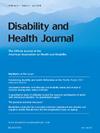The role of perceived social support in subjective wellbeing among working-age U.S. adults with and without limitations in activities of daily living
IF 3.7
2区 医学
Q1 HEALTH CARE SCIENCES & SERVICES
引用次数: 0
Abstract
Background
Perceived social support may enhance subjective wellbeing (SWB) for adults with activities of daily living (ADL) limitations. However, little is known about how social support may mediate (explain) and/or moderate SWB differences among U.S. working-age adults with versus without ADL limitations.
Objective
This study examines the role of perceived emotional and instrumental support in hedonic, eudaimonic, and evaluative wellbeing among adults with and without ADL limitations.
Methods
Data were from the 2021 National Wellbeing Survey – a national survey of U.S. working-age adults aged 18–64 (N = 3775). We used regression analyses to investigate differences in hedonic, eudaimonic, and evaluative wellbeing between individuals with versus without ADL limitations, as well as the roles of emotional and instrumental social support in explaining observed differences. We used interaction terms to examine whether social support moderated the observed associations.
Results
Adults with ADL limitations reported lower SWB than those without limitations across all three dimensions. Depending on the degree of limitations, the associations between ADL limitations and SWB decreased in magnitude or were no longer statistically significant after accounting for emotional and instrumental support. While both types of support were associated with better SWB among the three ADL groups, those with ADL limitations may benefit less from emotional support on both eudaimonic and evaluative wellbeing than those without limitations.
Conclusions
Lower social support may contribute to worse SWB among adults with ADL limitations. Although this subpopulation may benefit from high social support, improving their SWB may require systemic interventions beyond simply enhancing social support.
感知到的社会支持在日常生活活动受限和未受限的美国工作年龄成年人的主观幸福感中的作用。
背景:对于日常生活能力(ADL)受限的成年人来说,感知到的社会支持可能会提高他们的主观幸福感(SWB)。然而,人们对社会支持如何调解(解释)和/或缓和有与没有日常生活活动限制的美国工作年龄成年人之间的主观幸福感差异知之甚少:本研究探讨了感知到的情感支持和工具性支持在有和没有 ADL 限制的成年人的享乐性、幸福感和评价性福祉中的作用:数据来自 2021 年全国幸福感调查,这是一项针对美国 18-64 岁工作年龄成年人的全国性调查(N = 3775)。我们使用回归分析来研究有 ADL 限制的人和没有 ADL 限制的人在享乐性、幸福感和评价性幸福感方面的差异,以及情感和工具性社会支持在解释观察到的差异方面的作用。我们使用交互项来研究社会支持是否调节了观察到的关联:结果:在所有三个维度上,ADL 受限的成年人的 SWB 均低于无 ADL 受限的成年人。在考虑了情感支持和工具性支持后,ADL 限制与 SWB 之间的关联程度降低或不再具有统计学意义,这取决于限制的程度。虽然在三个ADL群体中,这两种支持都与更好的SWB相关,但与无ADL限制的人相比,有ADL限制的人从情感支持中获得的幸福感和评价性幸福感可能更少:结论:较低的社会支持可能会导致有 ADL 限制的成年人的 SWB 更差。结论:较低的社会支持可能会导致有 ADL 限制的成年人的 SWB 更差。虽然这部分人群可能会从较高的社会支持中受益,但改善他们的 SWB 可能需要系统的干预措施,而不仅仅是加强社会支持。
本文章由计算机程序翻译,如有差异,请以英文原文为准。
求助全文
约1分钟内获得全文
求助全文
来源期刊

Disability and Health Journal
HEALTH CARE SCIENCES & SERVICES-PUBLIC, ENVIRONMENTAL & OCCUPATIONAL HEALTH
CiteScore
7.50
自引率
6.70%
发文量
134
审稿时长
34 days
期刊介绍:
Disability and Health Journal is a scientific, scholarly, and multidisciplinary journal for reporting original contributions that advance knowledge in disability and health. Topics may be related to global health, quality of life, and specific health conditions as they relate to disability. Such contributions include:
• Reports of empirical research on the characteristics of persons with disabilities, environment, health outcomes, and determinants of health
• Reports of empirical research on the Systematic or other evidence-based reviews and tightly conceived theoretical interpretations of research literature
• Reports of empirical research on the Evaluative research on new interventions, technologies, and programs
• Reports of empirical research on the Reports on issues or policies affecting the health and/or quality of life for persons with disabilities, using a scientific base.
 求助内容:
求助内容: 应助结果提醒方式:
应助结果提醒方式:


